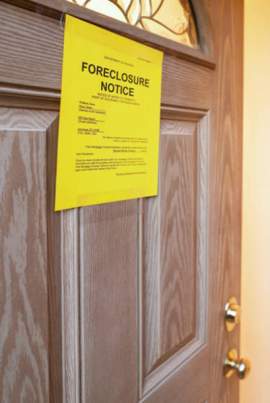
Protecting Tenants at Foreclosure Act of 2009

Popular In Foreclosure
Deed In Lieu Of Foreclosure Stop Foreclosure Pre Foreclosure Protecting Tenants At Foreclosure Act Of 2009 Deed In Lieu Of Foreclosure Maryland Avoid Foreclosure Foreclosure Help Eviction Process In Missouri Eviction Process In Alabama Foreclosure Process Short Sale Deed In Lieu Of Foreclosure Ohio
What is the Protecting Tenants in Foreclosure Act of 2009?
The Protecting Tenants in Foreclosure Act o 2009 was signed into law on May 20, 2009. The purpose of the law is to protect families who are forced into displacement because of foreclosures on the properties they are renting.
The Protecting Tenants in Foreclosure provisions apply in the case of any foreclosure on a “federally related mortgage loan” or on any dwelling or residential real property. They provide that “any immediate successor in interest” in such a foreclosed property, including a bank that takes title to a house upon foreclosure, will assume the interest subject to the rights of any bona fide tenant and will need to comply with certain notice requirements.
Why was the Protecting Tenants in Foreclosure Act of 2009 passed?
The Protecting Tenants in Foreclosure Act of 2009 was passed due to the housing crisis that was the hallmark of what is known as the "Great Recession." During this period of time individuals who became victims of sub-prime mortgages and mortgage backed securities lost their homes to foreclosure sales by banking institutions. Not only were the home owners suffering from the downturn on the housing market but so were the renters of residential property.
The Protecting Tenants at Foreclosure Act was enacted to remedy this situation. Prior to this law tenants had little to no rights when their homes were being foreclosed on. There were state laws but they did little to ameliorate the impact on tenants and were permitted to remain in the foreclosed property for a relatively short period of time.
Often times these tenants have done nothing wrong and in many cases the landowners are either bankrupt or have disappeared. This leaves the tenant in a situation where they are required to leave when they have paid the next month's rent; they cannot retain their security deposit because of the bankruptcy of the property owner; and without the opportunity to arrange for new accommodations.
What does the Protection of Tenants at Foreclosure Act entail?
The Protection of Tenants at Foreclosure Act applies in all cases involving “any foreclosure on a federally related mortgage loan or on any dwelling or residential real property." The new law only protects properties that are foreclosed on after the enactment of the law on May 20, 2009.
The 3 main provisions of the Act are that
(1) new owners of a foreclosed property must give a bona fide tenant 90 days to vacate after providing the bona fide tenant with a notice to vacate.
(2) The new owner must allow any bona fide tenant who entered into a lease prior to the notice of foreclosure to remain in the property for the term of his/her lease; and
(3) the new owner must honor the bona fide tenant who is living on the property without a lease.
The 90 days notice is applicable only when the purchaser at foreclosure it either an individual who intends to occupy the residence as his/her primary residence; or when there is no leas or the lease is terminable at will under state law. If neither of these situations applies the tenant has the right to stay in the residence until the time remaining on the lease has expired.
What about section 8 housing?
The Protecting Tenants at Foreclosure Act also extend relief to section 8 tenants. A section 8 tenant is an individual, or family, that is offered government subsidized housing because they are a low-income housing. When there is a Section 8 tenancy, the new owner takes subject not only to the Section 8 voucher lease but also the Section 8 Housing Assistance Payments program. Generally, a just cause provision means that landlord are unable to evict renters except in statutorily defined circumstances such as the non-payment of rent.
Who qualifies as a bona fide tenant?
According to the Protection of Tenants at Foreclosure Act a lease or tenancy is bona fide if:
(1) the mortgagor or the child, spouse, or parent of the mortgagor under the contract is not the tenant;
(2) the lease or tenancy was the result of an arms-length transaction; and
(3) the lease or tenancy requires the receipt of rent that is not substantially less than fair market rent for the property or the unit’s rent is reduced or subsidized due to a Federal, State, or local subsidy." What this basically means is that in order to be a tenant the person who owns the property may not live there; the tenant must be leasing the property from the person who actually owns it; and the tenant may not be given any "favors" that would amount to the agreement not really being a lease.
Is a tenant still required to pay rent after the landowner is foreclosed upon?
Once a foreclosure proceeding is enacted it can take up to 18 months for the foreclosure to come to finality. Many individuals feel that it is unnecessary to pay the rent on the foreclosed property because of the situation. This is wrong. Up until the date of foreclosure the landowner has the right to receive rental payment from the tenant and may evict the tenant for failure to pay the established rent. In addition, even if the landowner does not come to collect the rent, upon foreclosure, the new owner may have grounds to evict the tenant prior to the statutory 90 days notice due to the infraction.
How does the foreclosure affect a security deposit?
Situations concerning security deposits are a matter of state law and every state is different. Under Florida law a new owner of leased property is not subject to repayment of a security deposit when he/she takes over the property. If the original landowner who is in contract with the tenant is still in control of the property during the foreclosure proceedings the tenant should send a written letter to the landowner requesting the return of the security deposit or its advancement towards the next month's rent. If the landowner cannot be found the tenant may file a claim for restitution in a small claims court.
"Cash for Keys"
In the State of California a new owner is permitted to offer the tenant money on the condition that they vacate the property prior to the 90 day statutory timeline prescribed by the Protecting Tenants at Foreclosure Act. Usually this period of time is reduced from 90 days to 30 days upon its acceptance. The offer and acceptance letter should be signed and a copy maintained by both parties. If the tenant refuses to accept the money he/she is permitted to stay in on the property for the 90 day period, or whatever remains on the lease.
How does the Dodd-Frank Act affect The Protecting Tenants at Foreclosure Act?
The Protecting Tenants at Foreclosure Act was originally set to expire in 2012. With the passage of the Dodd-Frank Act that date is extended until 2014. The Dodd-Frank act has also mandated that the secretary of HUD develop a program to refinance troubled multifamily mortgages.
Summary of the Protecting Tenants at Foreclosure Act of 2009:
The financial crisis--and more specifically the real estate collapse—of 2008 prompted President Barack Obama to pass legislation to provide protection for renters of foreclosed properties.
The Protecting Tenants at Foreclosure Act of 2009 provides a 90-day notice requirement, along with further protections, for tenants in foreclosed properties. Below is a list of the Protecting Tenants at Foreclosure Act of 2009 most fundamental provisions:
• During the term of the renter’s lease, the tenant is awarded the right to remain in the unit and cannot be evicted. The tenant, upon news of foreclosure, is allowed to stay in the rental property for the remainder of his or her lease. The tenant may only be evicted for actions that will constitute good cause, i.e. severe breaches of the landlord/tenant contract
• If the lease is terminated prior to the 90 day window, the new owner may not evict the tenant without giving the tenant the allotted 90 day notice.
• At the end of the lease, the new owner is permitted to terminate residency only if the new owner provides the 90-day notice as outlined in the Protecting Tenants at Foreclosure Act of 2009
• The new owner may terminate tenancy if the owner occupies the unit as his or her primary place of residency. If this situation arises, the owner must provide the tenant with a notice to vacate at least 90 days before the effective date—this represents the only exception to the rule that the tenant may not be evicted during the term of the lease.
*The above provisions expire on December 31st of 2012
Purpose of the Protecting Tenants at Foreclosure Act of 2009:
The Protecting Tenants at Foreclosure Act of 2009 was passed because renters and tenants are being affected by foreclosures almost as significantly as homeowners. The collapse of the mortgage industry resulted in millions of foreclosed properties; in addition to homeowners, renters are forced to scramble—with little or no warning of foreclosure—to find new residency.
Who are the Renters under The Protecting Tenants at Foreclosure Act of 2009:
A renter under The Protecting Tenants at Foreclosure Act of 2009 does not fit a uniform profile. Renters may live in condos, single-family homes, apartments or small buildings. Before May 20th of 2009, the majority of renters lost their leases if their rented properties were foreclosed on. States implemented their own rules regarding this situation and the majority of provisions stated that if a mortgage was recorded before a renter signed a lease; the impending foreclosure superseded the lease. Because most leases are for a year or shorter, the majority of mortgages predated signed leases—this of course resulted in the termination of the rental agreement, which in turn, forced renters out of their dwellings without notice.
These rules were overhauled when Obama signed The Protecting Tenants at Foreclosure Act of 2009. The legislation provided that leases would survive an impending foreclosure; the tenant could stay till at least the end of the lease and month-to-month tenants would be awarded a 90 day notice of foreclosure.



















